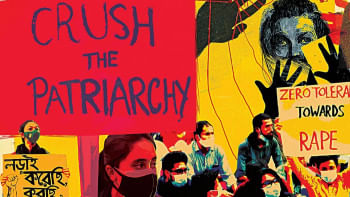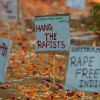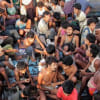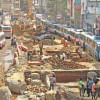The vicious cycle sex workers are trapped in

Conversations around sex work in Bangladesh are almost always clouded by taboos. Whether these stem from cultural sensitivities, simply discussing the existence of these women is often evaded or whispered in hushed tones. However, the opinions surrounding prostitution in Bangladesh do not render the trade non-existent.
Prostitution was formally legalised in Bangladesh in 2000 through a High Court ruling, sparked by the yearlong detention of 100 sex workers. However, "legal" entry into sex work requires signing an affidavit to signify that the person is at least 18 years old. Other provisions aimed at combating trafficking include sections 364A, 366A, and 373 of the Penal Code, which prescribe imprisonment of anyone who attempts to abduct and traffic a child under 10, induce a minor into forced sex work, or purchase the sexual services of a minor.
In theory, these provisions might seem like a solid foundation for addressing forced sex slavery. However, the reality is quite different.
Sex trafficking has been rampant in the country, and even extends beyond borders. Young girls and women are typically lured into trafficking rings with false promises of better work opportunities that would allow them to support themselves or their families. There have also been reports of women turning to sex work as a last-ditch effort to survive on their own or feed their children.
Given the lax nature of Bangladesh's legal enforcement measures, traffickers can easily coerce victims into signing forged documents stating that they are of legal age and willingly entering the trade. If that doesn't work, police personnel can be easily bribed to ignore the situation.
Once these women are sold into prostitution, they are further trapped by fabricated debts by brothel owners or pimps. The girls are often forced to stay at brothels or work as floating sex workers to repay debts that seem astronomical compared to their meagre incomes. Even if they manage to pay off their initial debt, the amount is often increased several times over, further ensnaring them in the business.
Once victims enter the trade, they are subject to abuse that has historically been associated with the profession. They are often forced to ingest steroids to gain weight and attract more clients despite the long-lasting detrimental impacts on their health. The situation worsens with exposure to various sexually transmitted infections. Physical violence is rampant as well, with 80 percent of street-based and transgender sex workers reporting in a survey that they have been physically assaulted by clients or others.
The violence extends beyond sex workers to those involved peripherally to the trade. On August 29, a former sex worker, currently working as a field officer for Ahsania Mission's project on HIV prevention, was brutally attacked by a man while she was distributing contraceptives to floating sex workers in Shyamoli. On the same day, another field worker was beaten in the Sangsad Bhaban area while on duty.
If these women seek justice for the abuse or attempt to escape their nightmarish situation, they are often met with indifference or outright dismissal.
As it stands, the very operational nature of sex work in Bangladesh traps these women into a never-ending cycle of abuse based on the exploitation of their circumstances. The narrative that gets lost is that these women are generally coerced into this life, seemingly trapped until their deaths. They often end up giving birth to children, either within the confines of the brothels in which they are bound, or within their line of working as a floating sex worker. The cycle of exploitation ultimately continues, with a general pattern of female children being groomed into the business and male children oftentimes becoming pimps themselves.
Even if the women manage to escape sexual slavery, they are typically subjected to a lifetime of ostracism and discrimination. They are barred from most employment opportunities, and their reintegration into society is hindered by widespread conservative views that regard them as "less than" due to their past.
Given the current circumstances, combating sex trafficking in Bangladesh seems paradoxical. Women currently involved in sex work usually undergo years of harsh abuse, only to be met with more abuse and staggering levels of discrimination if they manage to escape.
In this time of reform, victims of sexual exploitation should not be overlooked simply because the nature of their work is considered "taboo." Provisions should be introduced to free existing workers from abuse and discrimination and to make sure the alarming rate of sex trafficking is mitigated.
Reform needs to start with law enforcement. Victims of abuse and violence cannot be expected to turn to those who ignore their suffering or perpetuate it in exchange for bribes.
Additionally, reforms should extend beyond sex work itself. In most cases, the women are forced to give away a significant portion of their lives to the trade, which means their scope for obtaining education and employment is heavily obstructed. Victims cannot rely on their families or previous communities either, as they are frequently shunned.
Therefore, more efforts should be focused on the women's rehabilitation and assimilation back into society. It is unlikely that sex workers can save up enough to sustain themselves outside of brothels, as pimps and madams typically take the majority of their earnings, leaving just enough for basic necessities. This is especially troubling if the women end up having children to look after. At minimum, provisions should include shelter and employment opportunities to ensure financial independence and a comfortable livelihood.
If workers have children, it must be ensured that the children do not face discrimination that prevents them from pursuing an education on par with other children their age. Although public opinion may not shift dramatically in a short time, more efforts are needed to establish schools that prevent such discrimination, especially in neighbourhoods with large populations of sex workers.
On a larger scale, a massive shift in our collective thinking is required. By viewing these young girls and women through a prejudiced lens, we are ultimately forcing them back into the very lives that we are judging them for being a part of. Reforms may not occur overnight—but it is necessary that the process be started. Because ultimately, even if someone views sex work as a negative abstraction, the suffering of these women continues to be very real.
Fatima Jahan Ena is a member of the editorial team at The Daily Star.
Views expressed in this article are the author's own.
Follow The Daily Star Opinion on Facebook for the latest opinions, commentaries and analyses by experts and professionals. To contribute your article or letter to The Daily Star Opinion, see our guidelines for submission.

 For all latest news, follow The Daily Star's Google News channel.
For all latest news, follow The Daily Star's Google News channel. 










Comments